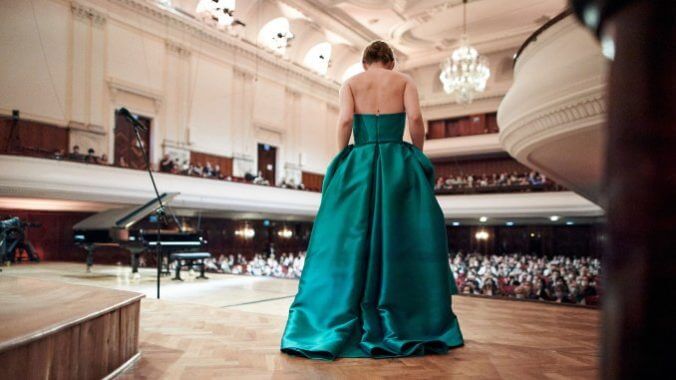Piano Competition Documentary Pianoforte Harmonizes Passion and Heartbreak

I don’t know a lot about Warsaw’s International Chopin Piano Competition, the subject of Jakub Piatek’s electric and affecting documentary Pianoforte, but I do know a lot about musical competition. I’ve been playing the trumpet since 2003, in massive marching band smackdowns, in the crowd at the Fiesta Bowl, in pin-drop quiet concert halls, and in intimate solo performance rooms. No matter the venue, it’s always the same pressure. Eyes are on you. The silent vacuum of potential that it’s your responsibility to fill, and fill well. If you think about it, if your mind is more active than your instincts, your body can seize up. Pure adrenaline threatens to overwhelm the notes. Your lips refuse to vibrate. Your fingers turn to lead. Music? What’s music? Miraculously, the young maestros overcome the intensity (mostly) and Piatek is there, watching the heartbreak and passion.
Pianoforte oscillates its dynamics, but its tempo rarely dips below allegro. We might pause for an intermission between rounds, but Piatek runs his behind-the-scenes access ragged. Coaches critique. Parents overbear. And the players bend at the piano bench, spines slouching, under this atmospheric weight. There’s a sweet spot of stress—both self-inflicted and pushed from the outside—where you’re nearly driven mad trying to put out your very best, while at the same time never falling over the brink and losing your love of whatever you’re doing. Some of the pianists reach that place, falling asleep at the ivories, only snapping to when reminded that there’s still (somehow) more Chopin to perfect. Other competitors burn out right in front of us.
All are given the freedom to win us over between practice sessions. It makes sense that they succeed: Part of their performance is projecting charisma beyond the sheet music. Wearing the fancy clothes, whipping their impassioned limbs around like Bugs Bunny in Rhapsody Rabbit. Naturally, they know how to work an audience. Also, they’re hilarious, eccentric teens—you don’t obsessively study piano your whole life and not become a winning weirdo.
Marcin Wieczorek, who’d rather be playing Xbox, is constantly breaking the doc’s fourth wall, adding a somber melody to his own sequences. “Life is sad,” he smirks. Alexander Gadjiev does yoga to stay sane between runs of the same etude, jokingly talking back to a dad who notes that he sounded better the day before. Not only do we come to care for the individual competitors, we get a glimpse of the tight bonds and inside jokes forged by people in these highly specific niche communities, often all too briefly and between the delirious shells left after a draining tournament. It’s the kind of kinship shared by the best-of-the-best, because nobody else can truly empathize. It’s the kind of kinship ensuring that the International Olympic Committee continues handing out free condoms for its athletes—people get close in these kinds of situations, where emotions run high and you finally meet people who get it.
Sometimes, we even get peeks into the cultural nuances threading throughout the musician-teacher relationships: Italian pianist Leonora Armellini is coached to be seductive, not like a little girl; Russian Eva Gevorgyan is hounded by her ball-busting taskmaster; Chinese pianist Hao Rao is babied by his long-time lessongiver. “I thought you were his mom!” a woman tells Hao’s teacher. “I wish,” she replies. Though…she kind of is. As we see from home movies, she’s been training him since childhood.
There’s a lot of would-be schmaltz like that, embellished here and there like grace notes, but the confident filmmaking and surefire structure of an ever-whittling group of contestants maintain its meat-and-potatoes feel. This is an observational, elegant documentary, and the tugs at our heartstrings are all earned. And the music! Pianoforte crosscuts performances of the same piece to give a sense of everyone’s musical personality—bouncy, solemn, cocky—and pop needledrops add a little youthful oomph to a documentary designed to desensitize us to Chopin.
-

-

-

-

-

-

-

-

-

-

-

-

-

-

-

-

-

-

-

-

-

-

-

-

-

-

-

-

-

-

-

-

-

-

-

-

-

-

-

-








































